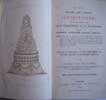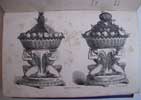THE ROYAL ENGLISH AND FOREIGN CONFECTIONER:
1862 A PRACTICAL TREATISE ON THE ART OF CONFECTIONARY IN ALL ITS BRANCHES; COMPRISING ORNAMENTAL CONFECTIONARY ARTISTICALLY DEVELOPED; DIFFERENT METHODS OF PRESERVING FRUITS, FRUIT PULPS, AND JUICES IN BOTTLES, THE PREPARATION OF JAMES AND JELLIES, FRUIT, AND OTHER SYRUPS, SUMMER BEVERAGES, AND A GREAT VARIETY OF NATIONAL DISHES; WITH DIRECTIONS FOR MAKING DESSERT CAKES, PLAIN AND FANCY BREAD, CANDIES, BONBONS, COMFITS, SPIRITOUS ESSENCES, AND CORDIALS. ALSO, THE ART OF ICE-MAKING, AND THE ARRANGEMENT AND GENERAL ECONOMY OF FASIONABLE DESSERTS. BY CHARLES ELME FRANCATELLI, PUPIL TO HE CELEBRATED CAREME, AND LATE MAITRE D'HOTEL TO HER MAJESTY THE QUEEN; AUTHOR OF "THE MODERN COOK," "THE COOKS GUIDE," AND "COOKERY FOR THE WORKING CLASSES." With numerous Illustrations in Chromo-Lithography. LONDON: CHAPMAN AND HALL, 193 PICADILLY. 1862. (The rights of Translaton is reserved.)
FIRST EDITION. 1fep. Half title. [2] Frontispiece of a Brides Cake. Title page. [1] (1)vi-viii Preface. (1)x-xxiii Contents. [1] (1)xxvi-xxviiList of Illustrations. [1] (1)2-396. 4p Bills of Fare. (1)402-422 Index. (1)2-18 Advertisements. Original navy blue cloth with ornate blind tooling and a fresh gilt deice on the front cover. The spine sympathetically relaid with the original cloth and gilt lettering and tooling. slightly darker than the boards. Overall a nice bright clean copy externally and internally with very light foxing to the half title and title pages. This is the scarce 1st edition not usually found in such good condition. There was also a 2nd of 1866 and a 3rd of 1874.
- Although little is written about him today Charles Elme Francatelli (1805-1876) was one of the culinary celebrities of his time. An Englishman of Italian extraction who traveled to France to work under the legendary Antonin Carême the founder of French haute cuisine. Revered for his blending of the best of Italian and French cuisine, Francatelli was regarded as a leading chef in Victorian London and spent most of his career in Britain directing the kitchens of several aristocrats and nobleman. In particular his early career saw him in the employ of the Earl of Chesterfield, Earl of Dudley and Lord Kinnaird at Rossie Priory in Perthshire. In 1840 he was back in London managing the plush and fashionable Crockford's, a successful private club and gaming house on the west side of St James's street. Despite only being at Crockford's for a brief period it was to prove a successful move. Spotted by a steward of the royal household Francatelli was appointed maitre-d'hotel and chief cook in ordinary to the Queen. Although his royal appointment was short it was undoubtedly a highlight in his career. As to why he left is not clear. Some people speculate that it may have been Queen Victoria's lack of enthusiasm for French cuisine or maybe Prince Albert's tendency toward less extravagant culinary preparations. Either way in 1842 Francatelli left his royal duties after serving just one year. His next post saw Francatelli undertake the culinary management of the Coventry House Club, #106 Piccadilly (this became the St James's club in 1869, a gentleman's club that occupied the premises for over 100 years). In 1854 he was appointed chef de cuisine at the Reform Club whose kitchens designed by its first chef Alexis Soyer were described as the greatest in London. Francatelli remained there for seven years. Between 1863 and 1870 he managed the St. James's Hotel in Berkeley Street, and then joined the Freemasons' Tavern in Great Queen Street, a post he held until just before his death in 1876. Although Francatelli had the experience, charm and flourish necessary to please the highest of Royalty, his greatest love was the simple act of cooking. Even though he was able to dress the costliest and elaborate of banquets and despite working for some of the most distinguished of British aristocracy and gentry, Francatelli was known as a culinary economist. Often quoted, he once remarked that "he could feed every day a thousand families on the food that was wasted in London". To this end in 1852 he issued A ‘Plain Cookery Book for the Working Classes’, which contained information of practical value to the working classes. This included economical delights such as cow-heel broth, bubble and squeak , sheep's pluck and a pudding made of small birds. Known for his sweet tooth, Francatelli’s fourth book, "The Royal English and Foreign Confectionery Book" - 1862, was to be his last published work. Francatelli died at Eastbourne on 10 Aug. 1876 as one of the fortunate people who lived their lives doing what they loved best.





click on image to enlarge

Antiquarian category
ref number:
11032